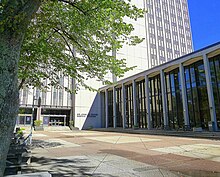Dalhousie University Faculty of Medicine
 Dalhousie Medical School campus | |
| Established | 1868 (School of Medicine) |
|---|---|
| Affiliation | Dalhousie University |
| Dean | Dr. David Anderson |
| Students | 108 per year |
| Location | Halifax , , |
| Website | medicine |
 | |
The Faculty of Medicine at Dalhousie University, also known as Dalhousie Medical School, is a medical school and faculty of Dalhousie University in Halifax, Nova Scotia, Canada.
The Faculty of Medicine has operated continuously since 1868 and is one of the oldest medical schools in Canada, after Laval, McGill, and Queen's.
The Faculty of Medicine currently teaches the MD degree at two campuses:
- Sir Charles Tupper Medical Building, Carleton Campus (Halifax, NS)
- Saint John Regional Hospital (Saint John, NB)
Dalhousie's postgraduate medical faculty offers 53 residency programs at teaching hospitals located across Nova Scotia, New Brunswick and Prince Edward Island.
History[]
The Faculty of Medicine was founded in 1868. It graduated its first woman in 1894.[1] The school's main teaching location is the Sir Charles Tupper Medical Building which is a 15-story high-rise building that opened in 1965 on Dalhousie University's Carleton Campus. The first woman to be appointed Dean was Noni MacDonald in 1999.[2] Today, the Tupper Medical Building houses the administrative offices of the Faculty of Medicine and the Faculty of Health Sciences, as well as the Kellogg Health Sciences Library, lecture theatres, a large cadaveric anatomy laboratory, and most of the basic science laboratories in the Faculty of Medicine. It adjoins the CRC, the Clinical Research Centre, via "The Tupper Link" corridor, which is the location of many state-of-the-art lecture halls equipped with teleconferencing technology. The CRC houses the Dean of Medicine's office as well as affiliated administrative offices.
The Faculty of Medicine is the only medical school in the Maritime Provinces and as such is closely affiliated with the healthcare systems operated by the Government of Nova Scotia, the Government of New Brunswick and the Government of Prince Edward Island. This region has a combined population of 1.8 million people with teaching hospitals located in various locations across the three provinces, as well as the Queen Elizabeth II Health Sciences Centre and IWK Health Centre (in Halifax) and the Saint John Regional Hospital in the immediate vicinity of the medical school's 2 campuses.
Curriculum[]
The Doctor of Medicine program admits 108 students per year. Of these, 78 matriculants attend the Halifax Campus and 30 attend the New Brunswick campus in Saint John, New Brunswick. In 2010, the average undergraduate GPA of accepted applicants was 3.8, and 24 percent of the entering class held graduate degrees.
Dalhousie awards the MD degree to students completing "the Tupper Trail," a new curriculum developed by the Faculty of Medicine.[3] This program incorporates early exposure to clinical skills and clinical electives from Year 1, as well as collaboration projects with students in other health professions.
In 2010, it was reported that Dalhousie medical students placed first in Canada on the Medical Council of Canada Qualifying Examination, the school-leaving exam written by all Canadian MD candidates.[4]
Affiliated teaching hospitals[]
This section does not cite any sources. (July 2015) |
- Queen Elizabeth II Health Sciences Centre (Halifax, NS)
- IWK Health Centre (Halifax, NS)
- Nova Scotia Hospital (Dartmouth, NS)
- Saint John Regional Hospital (Saint John, NB)
- Moncton Hospital (Moncton, NB)
- Dr.Everett Chalmers Hospital (Fredericton, NB)
- Queen Elizabeth Hospital (Charlottetown, PEI)
- Dartmouth General Hospital (Dartmouth, NS)
- Cape Breton Regional Hospital (Sydney, NS)
- (Truro, NS)
- (Bridgewater, NS)
- Valley Regional Hospital (Kentville, NS)
- (Lower Sackville, NS)
- (Windsor, NS)
Notable faculty and alumni[]
This section does not cite any sources. (July 2015) |
- Sir Charles Tupper (1821–1915), dean of Dalhousie Medical School, prime minister of Canada in 1896, first president of the Canadian Medical Association.
- Annie Isabella Hamilton (1866-1941), the first woman in Nova Scotia to receive an M.D.[5]
- Jock Murray (MD'63), neurologist and medical historian in the history of neurology
- Shane Neilson (born 1975), Canadian physician and poet
- Ron Stewart (MD'70), Former Nova Scotian Minister of Health (1990), and a pioneer of the specialty of Emergency Medicine.
- Ban Tsui, Professor of Anesthesiology at University of Alberta, pioneered the Tsui Test
- Walter C. Mackenzie, Professor of Surgery (1949-1959) and Dean of Medicine (1959-1974) at the University of Alberta.
- William A. Cochrane, Professor of Pediatrics at Dalhousie Medical School (1957-1967), Physician in Chief, Children's Hospital, Halifax (1963-1967), founding Dean of Medicine at the University of Calgary (1967-1973), and third President of the University of Calgary (1974-1978).
Statistics[]
This section does not cite any sources. (July 2015) |
- The Undergraduate Medical Program for the MD degree was initiated in 1868, graduating its first students in May 1900. At present, 108 students are admitted to the program each year.
- The Dalhousie Medical Research Foundation oversees more than $2 million in medical research a year, with a growth of 27% in the past year.
- For 2008, total medical student enrollment was 397, distributed across the New Brunswick and Nova Scotia campuses.
References[]
- ^ Johnson MacLeod, Enid (1990). Petticoat Doctors. Pottersfield Press.
- ^ "Dr. Noni MacDonald to be invested into Order of Nova Scotia". Dalhousie News. Retrieved 2019-12-31.
- ^ "Med 1 - Medicine - Dalhousie University". Tuppertrail.medicine.dal.ca. Retrieved 2015-07-09.
- ^ "Dal med grads rank first on national exam - Dal News - Dalhousie University". Dal News. 2010-02-19. Retrieved 2015-07-09.
- ^ Creese, Mary R.S.; Creese, Thomas M. (2010). Ladies in the Laboratory III. Scarecrow Press. p. 194.
External links[]
Coordinates: 44°38′20″N 63°35′01″W / 44.63898°N 63.58366°W
- Dalhousie University
- Medical schools in Canada
